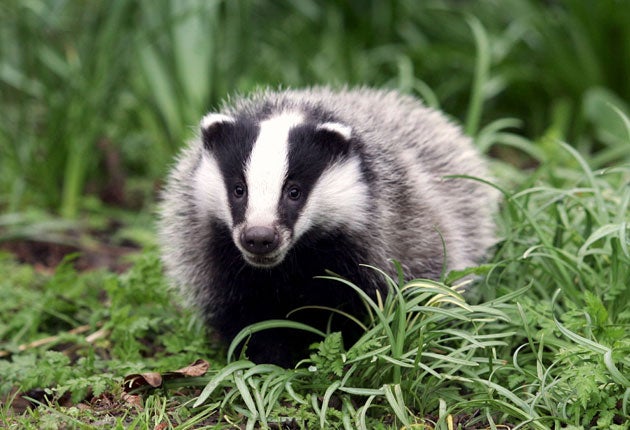Vaccine breakthrough may mean no more badger culls

British scientists have made a breakthrough which may enable cattle to be vaccinated against TB, doing away with the need to cull the badgers believed to be infecting them.
Currently, vaccinating cattle against bovine tuberculosis is banned throughout Europe, because there is no way of distinguishing in current diagnostic tests between an animal that has merely been vaccinated, and an animal that has actually contracted the disease.
Vaccinated but healthy cattle would thus appear contaminated and could not be sold or traded abroad – and TB vaccination of cattle has been prohibited across the EU since 1978.
However, researchers led by Professor Glyn Hewinson, of Animal Health and the Veterinary Laboratories Agency in Weybridge, Surrey, have developed a so-called "diva" test – meaning differentiation of infected from vaccinated animals – which makes the distinction between the two clear.
Such a test, if used in conjunction with a new cattle TB vaccine being developed simultaneously, would enable the Government to ask the EU for the law to be changed, so cattle could indeed be immunised against a disease which is rapidly spreading in parts of Britain, and has precipitated the highly controversial badger cull that is about to start.
However, both the vaccine and the test have to be validated by regulatory agencies, a long and complex process which "may take years", according to the Government's Chief Veterinary Officer, Nigel Gibbens.
That has to happen before EU law could be altered and the cattle vaccination ban lifted. In the meantime, the trial cull of badgers is set to begin in two pilot areas in Gloucestershire and Somerset.
The trial cull, which is strongly supported by farmers but has attracted intense opposition from animal welfare activists, who have been accused of harassing farmers and who have threatened to disrupt nighttime shooting operations.
The development of the diva or differentiation test was "absolutely critical", Mr Gibbens said.
"Yes, it has been developed, but there is a long way to go," he said. "We believe we've got one that can be practically applied, but in terms of getting international recognition for it, it is months and possibly years away."
Such a test has to be validated by the Paris-based OIE – the Organisation Internationale des Epizooties – or the World Organisation for Animal Health.
Similarly, the new cattle TB vaccine being developed in parallel by the Weybridge team has to be validated for efficacy and safety by Britain's Veterinary Medicines Directorate – a process which has already begun.
If both are passed as fit for purpose, Britain can then attempt to persuade the other 26 member states of the EU to lift the vaccination ban, something to which the Government is committed, Mr Gibbens said. "We're determined to push this through," he said. "But to get the vaccine and the test sorted, and a change in EU law, is some years away. I really would like to say we could accelerate this whole process, but I think 'years' is right."
Mr Gibbens, who has been Chief Vet, based in the Department for Environment, Food and Rural Affairs since 2008, said that more than £34m had already been spent on research "and we're committed to spending [£15.5m] in the next four years on a whole range of parallel streams of activities to try and get vaccines for cattle and badgers".
The other main area of the research is on an oral TB vaccine for badgers, which would be much simpler to administer – as it could be left out in bait – than the present injectable badger TB vaccine, which was licensed in 2010, and for which badgers have to be individually cage-trapped. Such an oral vaccine is being developed, Mr Gibbens said.
The Government is increasingly being criticised for not using the available injectable badger vaccine as a TB control programme instead of culling, something which is now happening in Wales.
Earlier this year John Griffiths, Environment Minister in the Labour Welsh Assembly, reversed the decision of the previous Labour-Plaid Cymru administration to carry out a cull, and a mass vaccination programme is being carried out in Pembrokeshire and Ceredigion. So far, 930 animals have been vaccinated
But the Government declines to go down this road, Mr Gibbens said, because "it's not quickly effective enough, it's difficult to do in practical terms, and it's expensive".
Cage-trapping badgers for vaccination (or indeed for shooting) costs about £2,500 per hectare, whereas simply shooting them as they run freely – which is about to happen in the English pilot culls – costs about £200.
While the cost of the pilot culls in England is to be met by farmers, the cost of the vaccination programme in Wales is currently being met by the Welsh Assembly Government.
Join our commenting forum
Join thought-provoking conversations, follow other Independent readers and see their replies
Comments
Bookmark popover
Removed from bookmarks